Report: Emotional Intelligence in Executive Coaching Program Analysis
VerifiedAdded on 2023/01/04
|7
|1955
|33
Report
AI Summary
This report examines the crucial role of emotional intelligence (EI) in executive coaching programs and its impact on business development. It begins with an introduction and a literature review, defining EI as the ability to understand, use, and manage emotions positively to reduce stress, empathize, and communicate effectively. The report focuses on the application of EI in executive coaching, emphasizing self-awareness, self-management, relationship management, and social awareness. The literature review explores how EI enhances leadership, improves job performance, and fosters a more positive and collaborative work environment. The report highlights the benefits of EI in coaching programs, including improved communication, conflict resolution, and decision-making. The conclusion emphasizes the importance of EI for organizational success and suggests future research on its impact on coaching program outcomes.
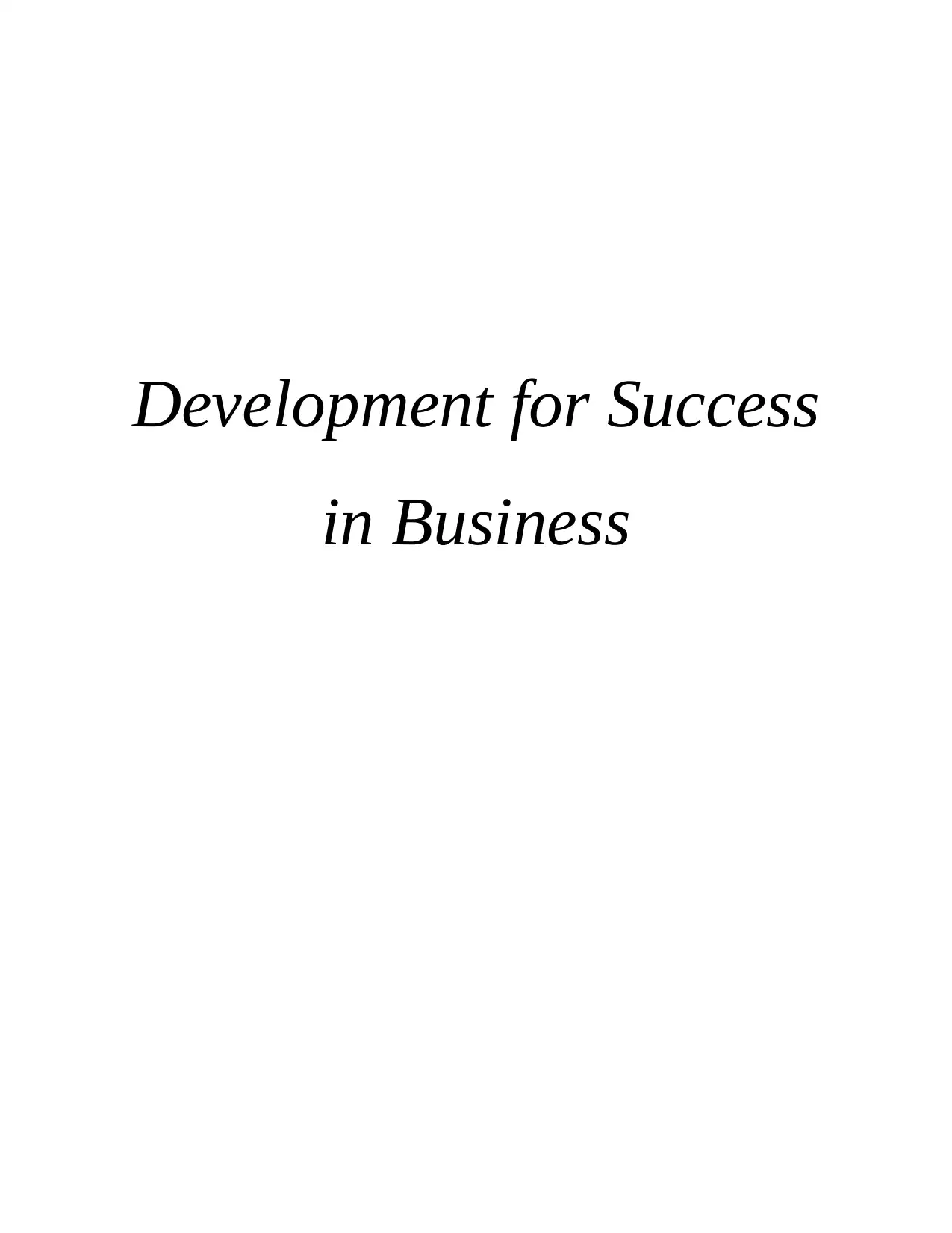
Development for Success
in Business
in Business
Paraphrase This Document
Need a fresh take? Get an instant paraphrase of this document with our AI Paraphraser
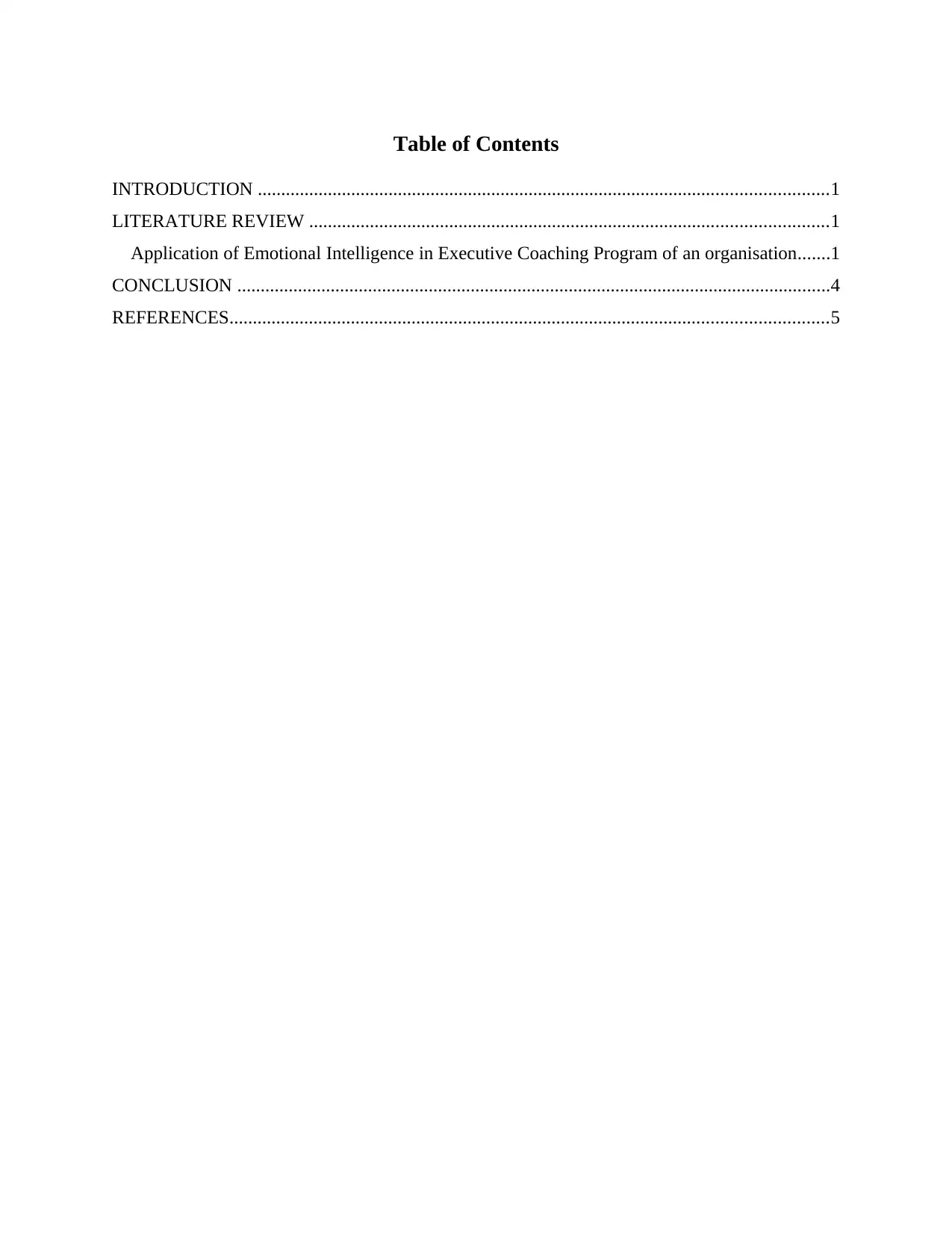
Table of Contents
INTRODUCTION ..........................................................................................................................1
LITERATURE REVIEW ...............................................................................................................1
Application of Emotional Intelligence in Executive Coaching Program of an organisation.......1
CONCLUSION ...............................................................................................................................4
REFERENCES................................................................................................................................5
INTRODUCTION ..........................................................................................................................1
LITERATURE REVIEW ...............................................................................................................1
Application of Emotional Intelligence in Executive Coaching Program of an organisation.......1
CONCLUSION ...............................................................................................................................4
REFERENCES................................................................................................................................5
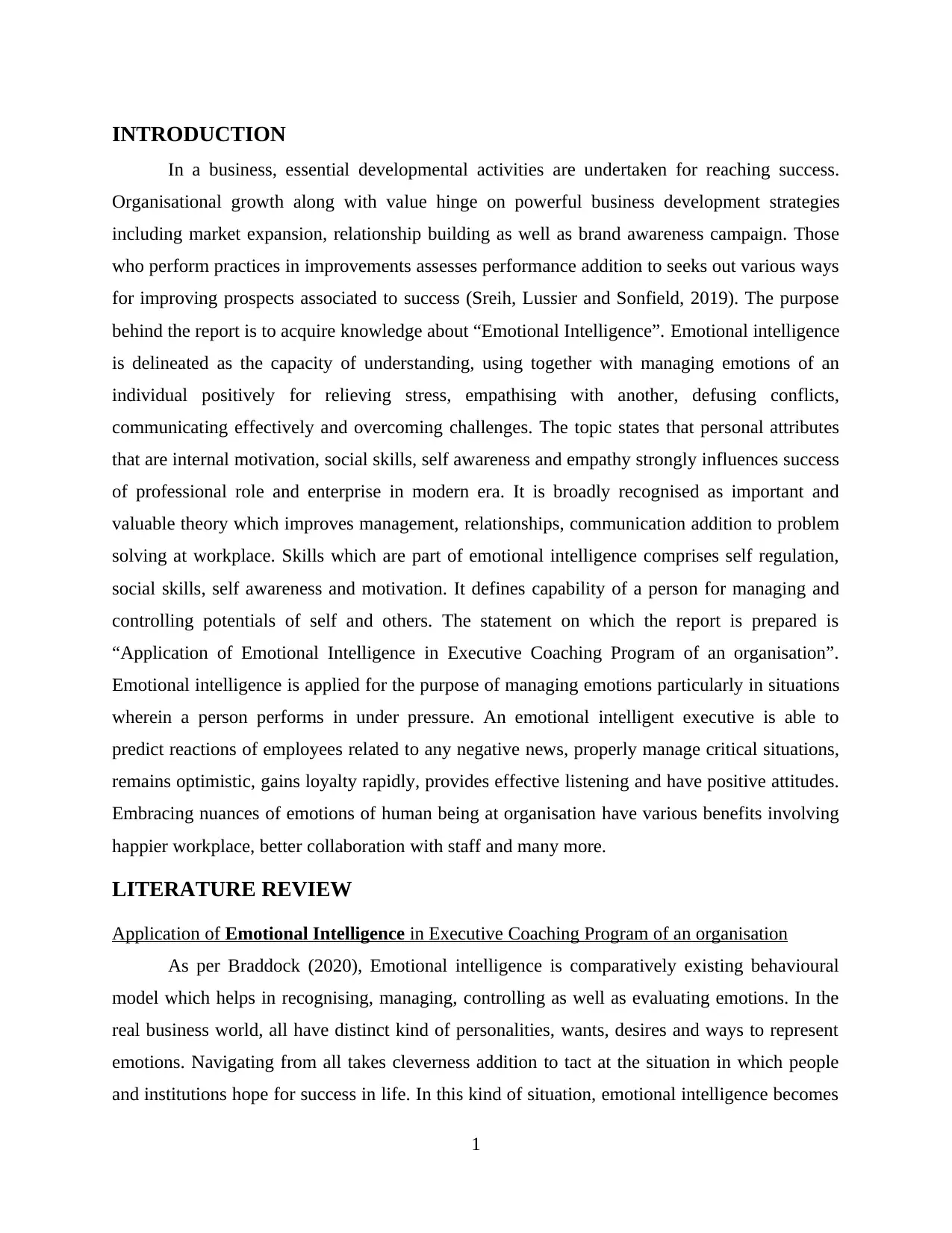
INTRODUCTION
In a business, essential developmental activities are undertaken for reaching success.
Organisational growth along with value hinge on powerful business development strategies
including market expansion, relationship building as well as brand awareness campaign. Those
who perform practices in improvements assesses performance addition to seeks out various ways
for improving prospects associated to success (Sreih, Lussier and Sonfield, 2019). The purpose
behind the report is to acquire knowledge about “Emotional Intelligence”. Emotional intelligence
is delineated as the capacity of understanding, using together with managing emotions of an
individual positively for relieving stress, empathising with another, defusing conflicts,
communicating effectively and overcoming challenges. The topic states that personal attributes
that are internal motivation, social skills, self awareness and empathy strongly influences success
of professional role and enterprise in modern era. It is broadly recognised as important and
valuable theory which improves management, relationships, communication addition to problem
solving at workplace. Skills which are part of emotional intelligence comprises self regulation,
social skills, self awareness and motivation. It defines capability of a person for managing and
controlling potentials of self and others. The statement on which the report is prepared is
“Application of Emotional Intelligence in Executive Coaching Program of an organisation”.
Emotional intelligence is applied for the purpose of managing emotions particularly in situations
wherein a person performs in under pressure. An emotional intelligent executive is able to
predict reactions of employees related to any negative news, properly manage critical situations,
remains optimistic, gains loyalty rapidly, provides effective listening and have positive attitudes.
Embracing nuances of emotions of human being at organisation have various benefits involving
happier workplace, better collaboration with staff and many more.
LITERATURE REVIEW
Application of Emotional Intelligence in Executive Coaching Program of an organisation
As per Braddock (2020), Emotional intelligence is comparatively existing behavioural
model which helps in recognising, managing, controlling as well as evaluating emotions. In the
real business world, all have distinct kind of personalities, wants, desires and ways to represent
emotions. Navigating from all takes cleverness addition to tact at the situation in which people
and institutions hope for success in life. In this kind of situation, emotional intelligence becomes
1
In a business, essential developmental activities are undertaken for reaching success.
Organisational growth along with value hinge on powerful business development strategies
including market expansion, relationship building as well as brand awareness campaign. Those
who perform practices in improvements assesses performance addition to seeks out various ways
for improving prospects associated to success (Sreih, Lussier and Sonfield, 2019). The purpose
behind the report is to acquire knowledge about “Emotional Intelligence”. Emotional intelligence
is delineated as the capacity of understanding, using together with managing emotions of an
individual positively for relieving stress, empathising with another, defusing conflicts,
communicating effectively and overcoming challenges. The topic states that personal attributes
that are internal motivation, social skills, self awareness and empathy strongly influences success
of professional role and enterprise in modern era. It is broadly recognised as important and
valuable theory which improves management, relationships, communication addition to problem
solving at workplace. Skills which are part of emotional intelligence comprises self regulation,
social skills, self awareness and motivation. It defines capability of a person for managing and
controlling potentials of self and others. The statement on which the report is prepared is
“Application of Emotional Intelligence in Executive Coaching Program of an organisation”.
Emotional intelligence is applied for the purpose of managing emotions particularly in situations
wherein a person performs in under pressure. An emotional intelligent executive is able to
predict reactions of employees related to any negative news, properly manage critical situations,
remains optimistic, gains loyalty rapidly, provides effective listening and have positive attitudes.
Embracing nuances of emotions of human being at organisation have various benefits involving
happier workplace, better collaboration with staff and many more.
LITERATURE REVIEW
Application of Emotional Intelligence in Executive Coaching Program of an organisation
As per Braddock (2020), Emotional intelligence is comparatively existing behavioural
model which helps in recognising, managing, controlling as well as evaluating emotions. In the
real business world, all have distinct kind of personalities, wants, desires and ways to represent
emotions. Navigating from all takes cleverness addition to tact at the situation in which people
and institutions hope for success in life. In this kind of situation, emotional intelligence becomes
1
⊘ This is a preview!⊘
Do you want full access?
Subscribe today to unlock all pages.

Trusted by 1+ million students worldwide
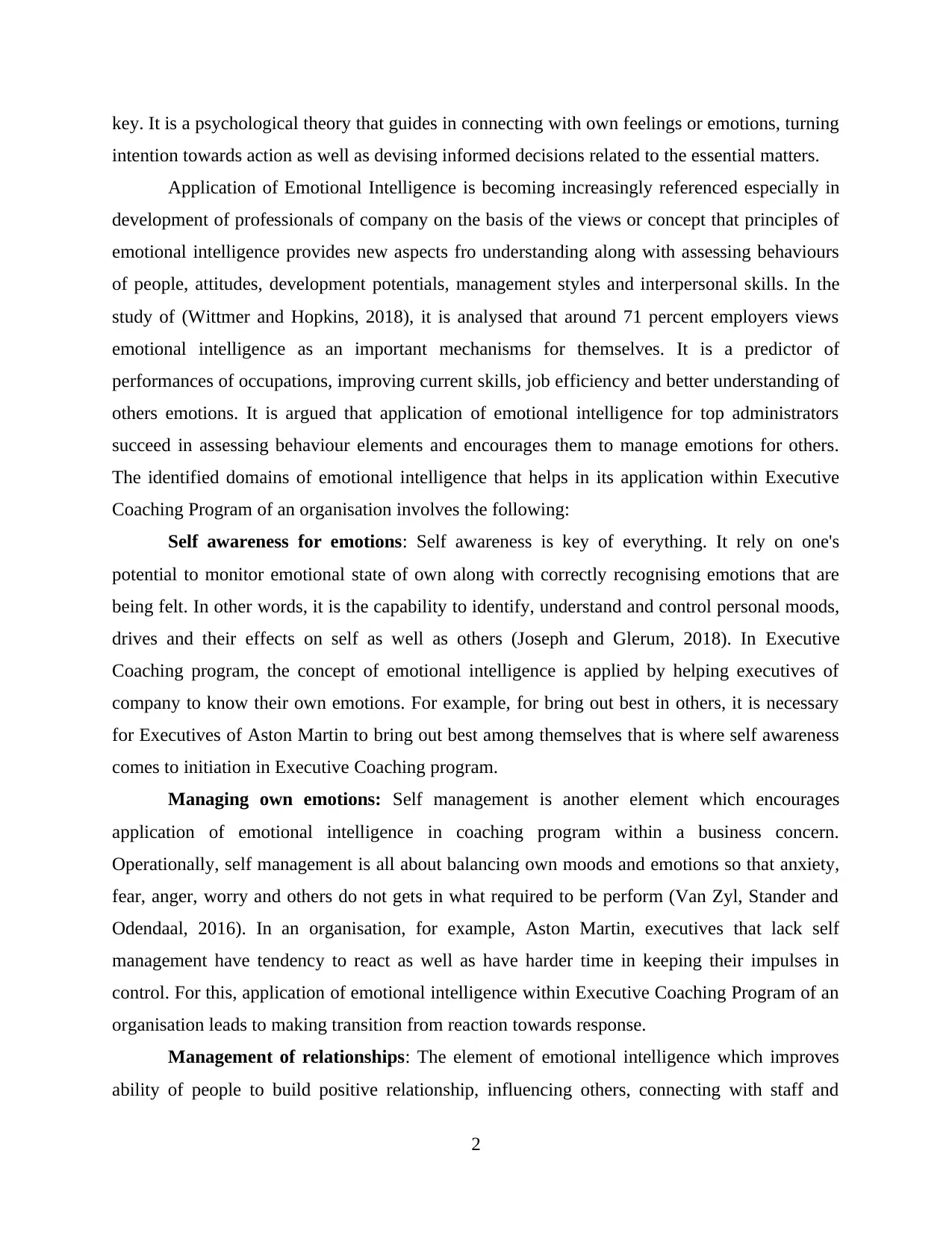
key. It is a psychological theory that guides in connecting with own feelings or emotions, turning
intention towards action as well as devising informed decisions related to the essential matters.
Application of Emotional Intelligence is becoming increasingly referenced especially in
development of professionals of company on the basis of the views or concept that principles of
emotional intelligence provides new aspects fro understanding along with assessing behaviours
of people, attitudes, development potentials, management styles and interpersonal skills. In the
study of (Wittmer and Hopkins, 2018), it is analysed that around 71 percent employers views
emotional intelligence as an important mechanisms for themselves. It is a predictor of
performances of occupations, improving current skills, job efficiency and better understanding of
others emotions. It is argued that application of emotional intelligence for top administrators
succeed in assessing behaviour elements and encourages them to manage emotions for others.
The identified domains of emotional intelligence that helps in its application within Executive
Coaching Program of an organisation involves the following:
Self awareness for emotions: Self awareness is key of everything. It rely on one's
potential to monitor emotional state of own along with correctly recognising emotions that are
being felt. In other words, it is the capability to identify, understand and control personal moods,
drives and their effects on self as well as others (Joseph and Glerum, 2018). In Executive
Coaching program, the concept of emotional intelligence is applied by helping executives of
company to know their own emotions. For example, for bring out best in others, it is necessary
for Executives of Aston Martin to bring out best among themselves that is where self awareness
comes to initiation in Executive Coaching program.
Managing own emotions: Self management is another element which encourages
application of emotional intelligence in coaching program within a business concern.
Operationally, self management is all about balancing own moods and emotions so that anxiety,
fear, anger, worry and others do not gets in what required to be perform (Van Zyl, Stander and
Odendaal, 2016). In an organisation, for example, Aston Martin, executives that lack self
management have tendency to react as well as have harder time in keeping their impulses in
control. For this, application of emotional intelligence within Executive Coaching Program of an
organisation leads to making transition from reaction towards response.
Management of relationships: The element of emotional intelligence which improves
ability of people to build positive relationship, influencing others, connecting with staff and
2
intention towards action as well as devising informed decisions related to the essential matters.
Application of Emotional Intelligence is becoming increasingly referenced especially in
development of professionals of company on the basis of the views or concept that principles of
emotional intelligence provides new aspects fro understanding along with assessing behaviours
of people, attitudes, development potentials, management styles and interpersonal skills. In the
study of (Wittmer and Hopkins, 2018), it is analysed that around 71 percent employers views
emotional intelligence as an important mechanisms for themselves. It is a predictor of
performances of occupations, improving current skills, job efficiency and better understanding of
others emotions. It is argued that application of emotional intelligence for top administrators
succeed in assessing behaviour elements and encourages them to manage emotions for others.
The identified domains of emotional intelligence that helps in its application within Executive
Coaching Program of an organisation involves the following:
Self awareness for emotions: Self awareness is key of everything. It rely on one's
potential to monitor emotional state of own along with correctly recognising emotions that are
being felt. In other words, it is the capability to identify, understand and control personal moods,
drives and their effects on self as well as others (Joseph and Glerum, 2018). In Executive
Coaching program, the concept of emotional intelligence is applied by helping executives of
company to know their own emotions. For example, for bring out best in others, it is necessary
for Executives of Aston Martin to bring out best among themselves that is where self awareness
comes to initiation in Executive Coaching program.
Managing own emotions: Self management is another element which encourages
application of emotional intelligence in coaching program within a business concern.
Operationally, self management is all about balancing own moods and emotions so that anxiety,
fear, anger, worry and others do not gets in what required to be perform (Van Zyl, Stander and
Odendaal, 2016). In an organisation, for example, Aston Martin, executives that lack self
management have tendency to react as well as have harder time in keeping their impulses in
control. For this, application of emotional intelligence within Executive Coaching Program of an
organisation leads to making transition from reaction towards response.
Management of relationships: The element of emotional intelligence which improves
ability of people to build positive relationship, influencing others, connecting with staff and
2
Paraphrase This Document
Need a fresh take? Get an instant paraphrase of this document with our AI Paraphraser
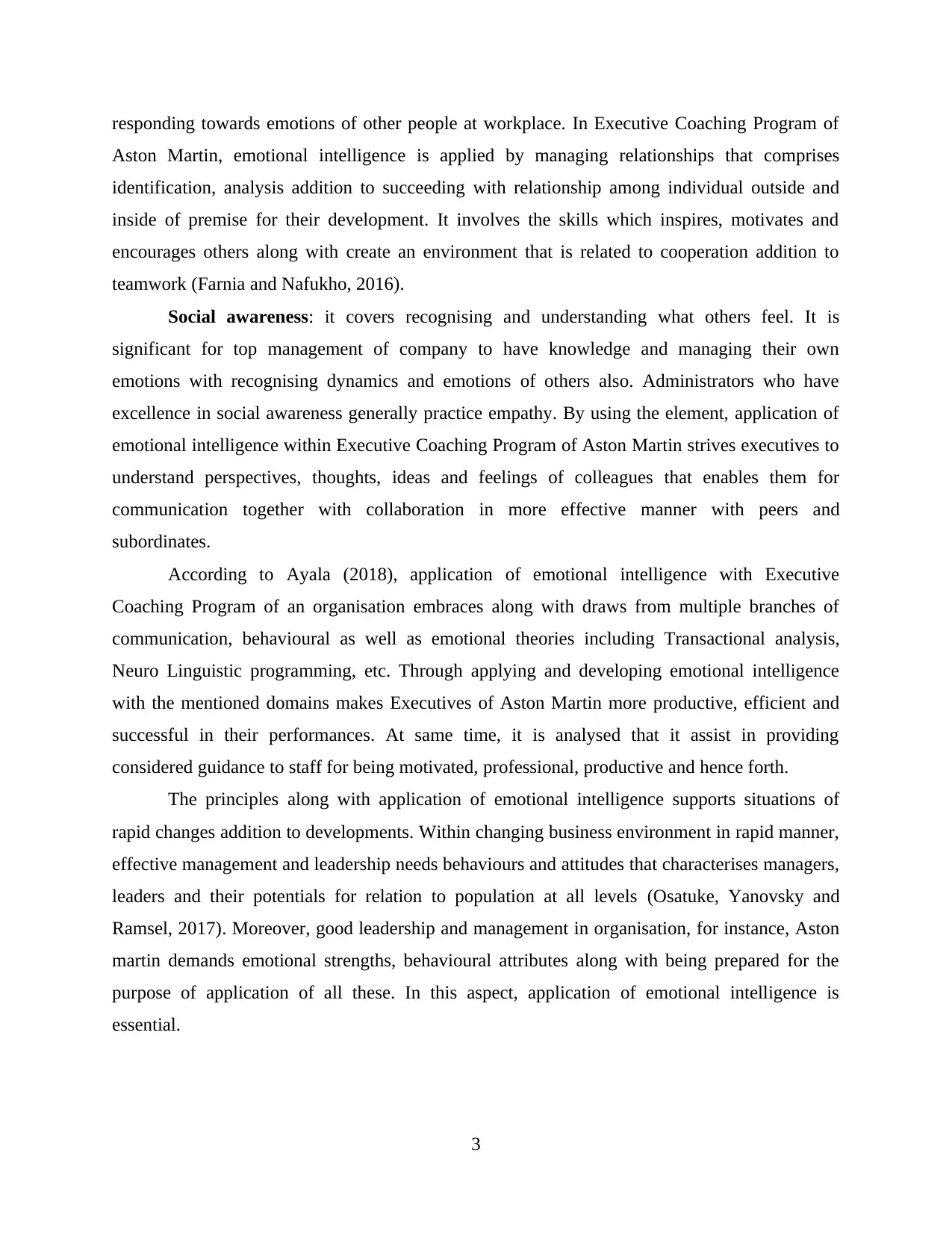
responding towards emotions of other people at workplace. In Executive Coaching Program of
Aston Martin, emotional intelligence is applied by managing relationships that comprises
identification, analysis addition to succeeding with relationship among individual outside and
inside of premise for their development. It involves the skills which inspires, motivates and
encourages others along with create an environment that is related to cooperation addition to
teamwork (Farnia and Nafukho, 2016).
Social awareness: it covers recognising and understanding what others feel. It is
significant for top management of company to have knowledge and managing their own
emotions with recognising dynamics and emotions of others also. Administrators who have
excellence in social awareness generally practice empathy. By using the element, application of
emotional intelligence within Executive Coaching Program of Aston Martin strives executives to
understand perspectives, thoughts, ideas and feelings of colleagues that enables them for
communication together with collaboration in more effective manner with peers and
subordinates.
According to Ayala (2018), application of emotional intelligence with Executive
Coaching Program of an organisation embraces along with draws from multiple branches of
communication, behavioural as well as emotional theories including Transactional analysis,
Neuro Linguistic programming, etc. Through applying and developing emotional intelligence
with the mentioned domains makes Executives of Aston Martin more productive, efficient and
successful in their performances. At same time, it is analysed that it assist in providing
considered guidance to staff for being motivated, professional, productive and hence forth.
The principles along with application of emotional intelligence supports situations of
rapid changes addition to developments. Within changing business environment in rapid manner,
effective management and leadership needs behaviours and attitudes that characterises managers,
leaders and their potentials for relation to population at all levels (Osatuke, Yanovsky and
Ramsel, 2017). Moreover, good leadership and management in organisation, for instance, Aston
martin demands emotional strengths, behavioural attributes along with being prepared for the
purpose of application of all these. In this aspect, application of emotional intelligence is
essential.
3
Aston Martin, emotional intelligence is applied by managing relationships that comprises
identification, analysis addition to succeeding with relationship among individual outside and
inside of premise for their development. It involves the skills which inspires, motivates and
encourages others along with create an environment that is related to cooperation addition to
teamwork (Farnia and Nafukho, 2016).
Social awareness: it covers recognising and understanding what others feel. It is
significant for top management of company to have knowledge and managing their own
emotions with recognising dynamics and emotions of others also. Administrators who have
excellence in social awareness generally practice empathy. By using the element, application of
emotional intelligence within Executive Coaching Program of Aston Martin strives executives to
understand perspectives, thoughts, ideas and feelings of colleagues that enables them for
communication together with collaboration in more effective manner with peers and
subordinates.
According to Ayala (2018), application of emotional intelligence with Executive
Coaching Program of an organisation embraces along with draws from multiple branches of
communication, behavioural as well as emotional theories including Transactional analysis,
Neuro Linguistic programming, etc. Through applying and developing emotional intelligence
with the mentioned domains makes Executives of Aston Martin more productive, efficient and
successful in their performances. At same time, it is analysed that it assist in providing
considered guidance to staff for being motivated, professional, productive and hence forth.
The principles along with application of emotional intelligence supports situations of
rapid changes addition to developments. Within changing business environment in rapid manner,
effective management and leadership needs behaviours and attitudes that characterises managers,
leaders and their potentials for relation to population at all levels (Osatuke, Yanovsky and
Ramsel, 2017). Moreover, good leadership and management in organisation, for instance, Aston
martin demands emotional strengths, behavioural attributes along with being prepared for the
purpose of application of all these. In this aspect, application of emotional intelligence is
essential.
3
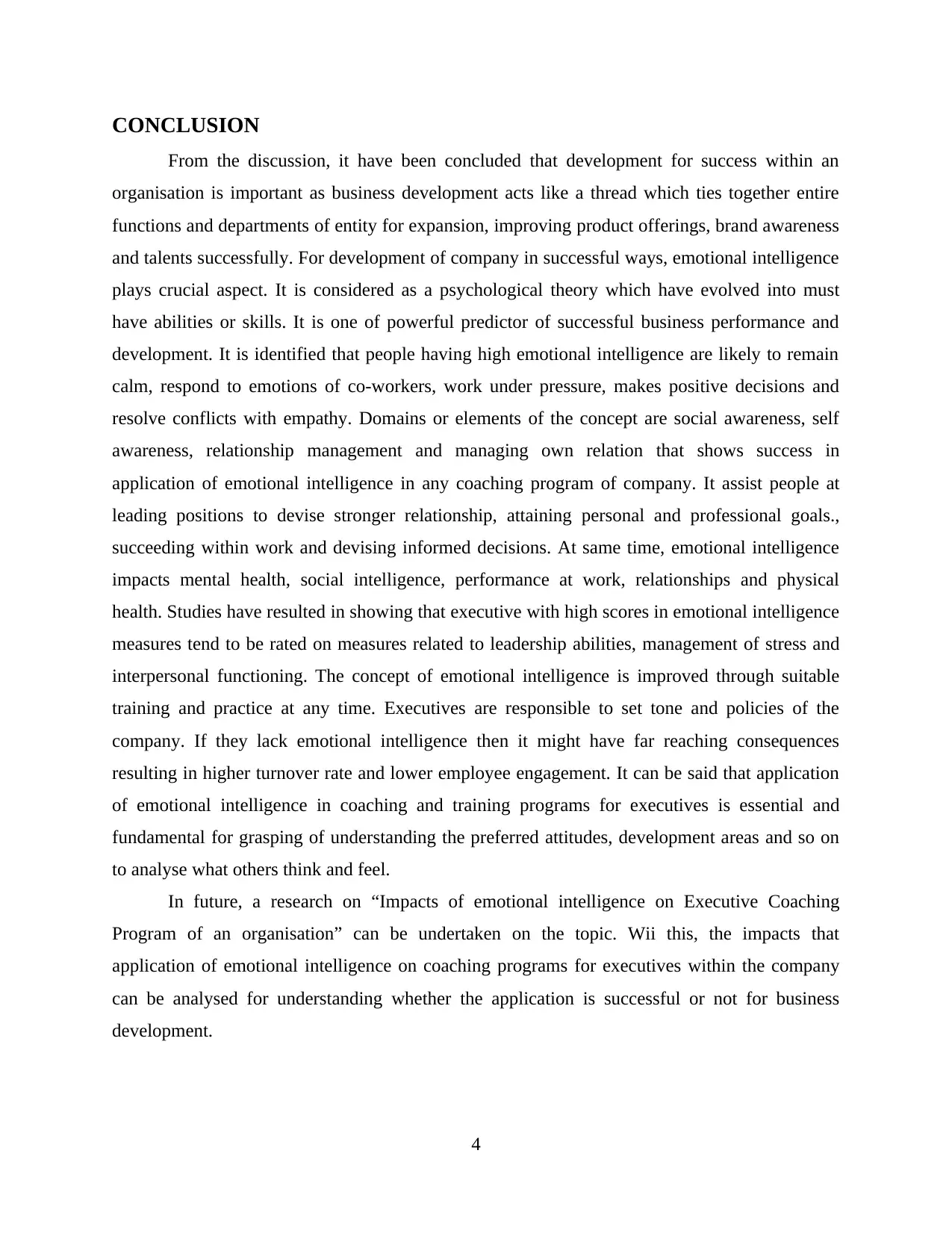
CONCLUSION
From the discussion, it have been concluded that development for success within an
organisation is important as business development acts like a thread which ties together entire
functions and departments of entity for expansion, improving product offerings, brand awareness
and talents successfully. For development of company in successful ways, emotional intelligence
plays crucial aspect. It is considered as a psychological theory which have evolved into must
have abilities or skills. It is one of powerful predictor of successful business performance and
development. It is identified that people having high emotional intelligence are likely to remain
calm, respond to emotions of co-workers, work under pressure, makes positive decisions and
resolve conflicts with empathy. Domains or elements of the concept are social awareness, self
awareness, relationship management and managing own relation that shows success in
application of emotional intelligence in any coaching program of company. It assist people at
leading positions to devise stronger relationship, attaining personal and professional goals.,
succeeding within work and devising informed decisions. At same time, emotional intelligence
impacts mental health, social intelligence, performance at work, relationships and physical
health. Studies have resulted in showing that executive with high scores in emotional intelligence
measures tend to be rated on measures related to leadership abilities, management of stress and
interpersonal functioning. The concept of emotional intelligence is improved through suitable
training and practice at any time. Executives are responsible to set tone and policies of the
company. If they lack emotional intelligence then it might have far reaching consequences
resulting in higher turnover rate and lower employee engagement. It can be said that application
of emotional intelligence in coaching and training programs for executives is essential and
fundamental for grasping of understanding the preferred attitudes, development areas and so on
to analyse what others think and feel.
In future, a research on “Impacts of emotional intelligence on Executive Coaching
Program of an organisation” can be undertaken on the topic. Wii this, the impacts that
application of emotional intelligence on coaching programs for executives within the company
can be analysed for understanding whether the application is successful or not for business
development.
4
From the discussion, it have been concluded that development for success within an
organisation is important as business development acts like a thread which ties together entire
functions and departments of entity for expansion, improving product offerings, brand awareness
and talents successfully. For development of company in successful ways, emotional intelligence
plays crucial aspect. It is considered as a psychological theory which have evolved into must
have abilities or skills. It is one of powerful predictor of successful business performance and
development. It is identified that people having high emotional intelligence are likely to remain
calm, respond to emotions of co-workers, work under pressure, makes positive decisions and
resolve conflicts with empathy. Domains or elements of the concept are social awareness, self
awareness, relationship management and managing own relation that shows success in
application of emotional intelligence in any coaching program of company. It assist people at
leading positions to devise stronger relationship, attaining personal and professional goals.,
succeeding within work and devising informed decisions. At same time, emotional intelligence
impacts mental health, social intelligence, performance at work, relationships and physical
health. Studies have resulted in showing that executive with high scores in emotional intelligence
measures tend to be rated on measures related to leadership abilities, management of stress and
interpersonal functioning. The concept of emotional intelligence is improved through suitable
training and practice at any time. Executives are responsible to set tone and policies of the
company. If they lack emotional intelligence then it might have far reaching consequences
resulting in higher turnover rate and lower employee engagement. It can be said that application
of emotional intelligence in coaching and training programs for executives is essential and
fundamental for grasping of understanding the preferred attitudes, development areas and so on
to analyse what others think and feel.
In future, a research on “Impacts of emotional intelligence on Executive Coaching
Program of an organisation” can be undertaken on the topic. Wii this, the impacts that
application of emotional intelligence on coaching programs for executives within the company
can be analysed for understanding whether the application is successful or not for business
development.
4
⊘ This is a preview!⊘
Do you want full access?
Subscribe today to unlock all pages.

Trusted by 1+ million students worldwide
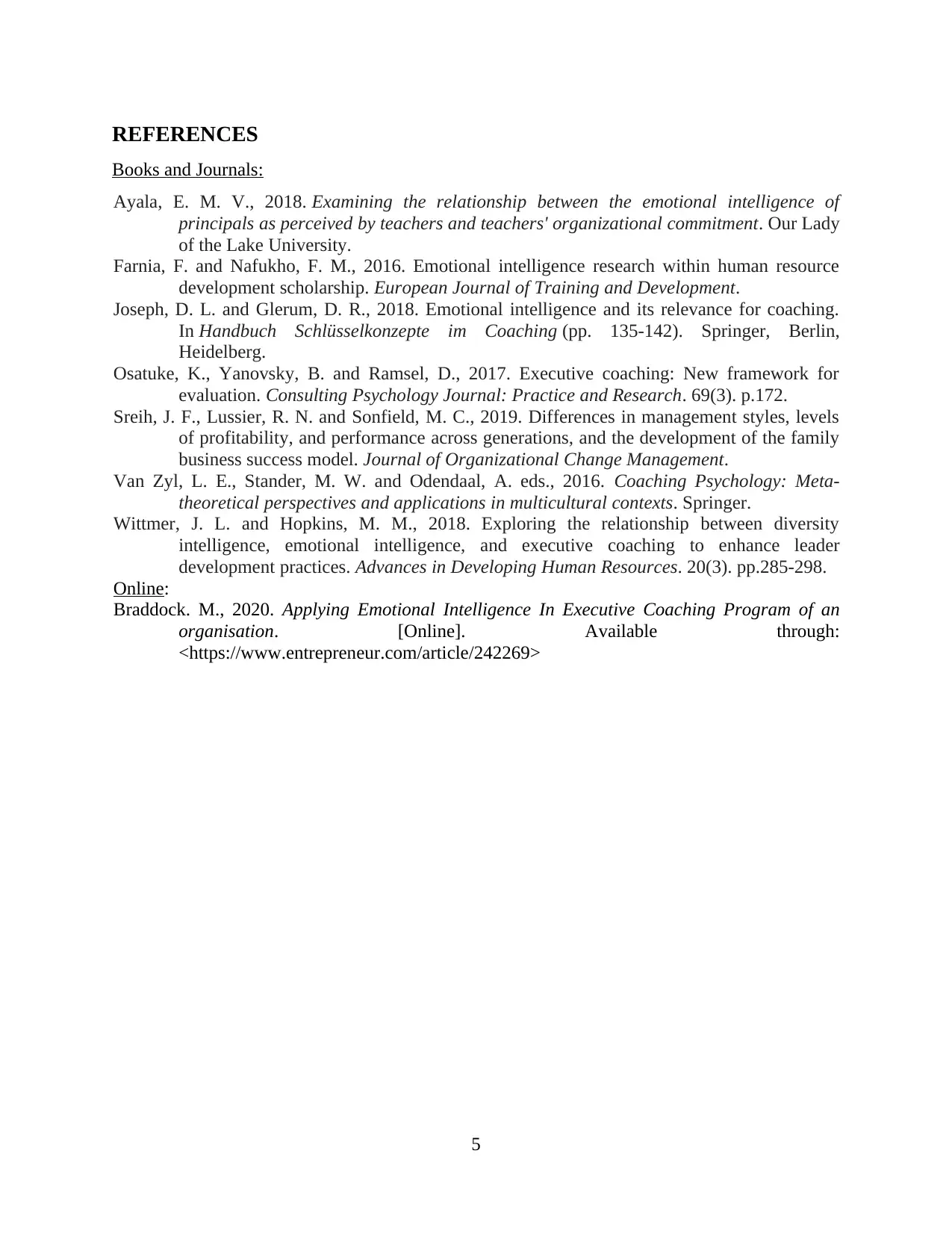
REFERENCES
Books and Journals:
Ayala, E. M. V., 2018. Examining the relationship between the emotional intelligence of
principals as perceived by teachers and teachers' organizational commitment. Our Lady
of the Lake University.
Farnia, F. and Nafukho, F. M., 2016. Emotional intelligence research within human resource
development scholarship. European Journal of Training and Development.
Joseph, D. L. and Glerum, D. R., 2018. Emotional intelligence and its relevance for coaching.
In Handbuch Schlüsselkonzepte im Coaching (pp. 135-142). Springer, Berlin,
Heidelberg.
Osatuke, K., Yanovsky, B. and Ramsel, D., 2017. Executive coaching: New framework for
evaluation. Consulting Psychology Journal: Practice and Research. 69(3). p.172.
Sreih, J. F., Lussier, R. N. and Sonfield, M. C., 2019. Differences in management styles, levels
of profitability, and performance across generations, and the development of the family
business success model. Journal of Organizational Change Management.
Van Zyl, L. E., Stander, M. W. and Odendaal, A. eds., 2016. Coaching Psychology: Meta-
theoretical perspectives and applications in multicultural contexts. Springer.
Wittmer, J. L. and Hopkins, M. M., 2018. Exploring the relationship between diversity
intelligence, emotional intelligence, and executive coaching to enhance leader
development practices. Advances in Developing Human Resources. 20(3). pp.285-298.
Online:
Braddock. M., 2020. Applying Emotional Intelligence In Executive Coaching Program of an
organisation. [Online]. Available through:
<https://www.entrepreneur.com/article/242269>
5
Books and Journals:
Ayala, E. M. V., 2018. Examining the relationship between the emotional intelligence of
principals as perceived by teachers and teachers' organizational commitment. Our Lady
of the Lake University.
Farnia, F. and Nafukho, F. M., 2016. Emotional intelligence research within human resource
development scholarship. European Journal of Training and Development.
Joseph, D. L. and Glerum, D. R., 2018. Emotional intelligence and its relevance for coaching.
In Handbuch Schlüsselkonzepte im Coaching (pp. 135-142). Springer, Berlin,
Heidelberg.
Osatuke, K., Yanovsky, B. and Ramsel, D., 2017. Executive coaching: New framework for
evaluation. Consulting Psychology Journal: Practice and Research. 69(3). p.172.
Sreih, J. F., Lussier, R. N. and Sonfield, M. C., 2019. Differences in management styles, levels
of profitability, and performance across generations, and the development of the family
business success model. Journal of Organizational Change Management.
Van Zyl, L. E., Stander, M. W. and Odendaal, A. eds., 2016. Coaching Psychology: Meta-
theoretical perspectives and applications in multicultural contexts. Springer.
Wittmer, J. L. and Hopkins, M. M., 2018. Exploring the relationship between diversity
intelligence, emotional intelligence, and executive coaching to enhance leader
development practices. Advances in Developing Human Resources. 20(3). pp.285-298.
Online:
Braddock. M., 2020. Applying Emotional Intelligence In Executive Coaching Program of an
organisation. [Online]. Available through:
<https://www.entrepreneur.com/article/242269>
5
1 out of 7
Related Documents
Your All-in-One AI-Powered Toolkit for Academic Success.
+13062052269
info@desklib.com
Available 24*7 on WhatsApp / Email
![[object Object]](/_next/static/media/star-bottom.7253800d.svg)
Unlock your academic potential
Copyright © 2020–2026 A2Z Services. All Rights Reserved. Developed and managed by ZUCOL.





